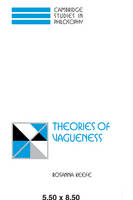
Theories of Vagueness
Seiten
2007
Cambridge University Press (Verlag)
978-0-521-03389-3 (ISBN)
Cambridge University Press (Verlag)
978-0-521-03389-3 (ISBN)
In this book, first published in 2000, Rosanna Keefe explores the questions of what we should want from an account of vagueness and how we should assess rival theories. Her powerful study will be of interest to readers in philosophy of mind and of language, philosophical logic, epistemology and metaphysics.
Most expressions in natural language are vague. But what is the best semantic treatment of terms like 'heap', 'red' and 'child'? And what is the logic of arguments involving this kind of vague expression? These questions are receiving increasing philosophical attention, and in this book, first published in 2000, Rosanna Keefe explores the questions of what we should want from an account of vagueness and how we should assess rival theories. Her discussion ranges widely and comprehensively over the main theories of vagueness and their supporting arguments, and she offers a powerful and original defence of a form of supervaluationism, a theory that requires almost no deviation from standard logic yet can accommodate the lack of sharp boundaries to vague predicates and deal with the paradoxes of vagueness in a methodologically satisfying way. Her study will be of particular interest to readers in philosophy of language and of mind, philosophical logic, epistemology and metaphysics.
Most expressions in natural language are vague. But what is the best semantic treatment of terms like 'heap', 'red' and 'child'? And what is the logic of arguments involving this kind of vague expression? These questions are receiving increasing philosophical attention, and in this book, first published in 2000, Rosanna Keefe explores the questions of what we should want from an account of vagueness and how we should assess rival theories. Her discussion ranges widely and comprehensively over the main theories of vagueness and their supporting arguments, and she offers a powerful and original defence of a form of supervaluationism, a theory that requires almost no deviation from standard logic yet can accommodate the lack of sharp boundaries to vague predicates and deal with the paradoxes of vagueness in a methodologically satisfying way. Her study will be of particular interest to readers in philosophy of language and of mind, philosophical logic, epistemology and metaphysics.
Acknowledgements; Introduction; 1. The phenomena of vagueness; 2. How to theorise about vagueness; 3. The epistemic view of vagueness; 4. Between truth and falsity: many-valued logics; 5. Vagueness by numbers; 6. The pragmatic account of vagueness; 7. Supervaluationism; 8. Truth is super-truth; References; Index.
| Erscheint lt. Verlag | 1.2.2007 |
|---|---|
| Reihe/Serie | Cambridge Studies in Philosophy |
| Zusatzinfo | Worked examples or Exercises |
| Verlagsort | Cambridge |
| Sprache | englisch |
| Maße | 140 x 216 mm |
| Gewicht | 320 g |
| Themenwelt | Geisteswissenschaften ► Philosophie ► Logik |
| ISBN-10 | 0-521-03389-6 / 0521033896 |
| ISBN-13 | 978-0-521-03389-3 / 9780521033893 |
| Zustand | Neuware |
| Haben Sie eine Frage zum Produkt? |
Mehr entdecken
aus dem Bereich
aus dem Bereich
ein Gegenentwurf zum kurzfristigen Denken : so werden wir zu den …
Buch | Hardcover (2023)
REDLINE (Verlag)
CHF 27,90
Buch | Softcover (2023)
De Gruyter (Verlag)
CHF 34,90


